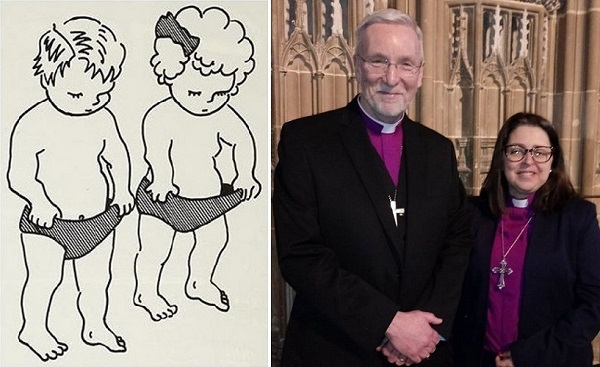The nuptial insanity of male headship, and the ecological insanity of irresponsible population growth, are rooted in the patriarchal corruption (Genesis 3:16) of the natural nuptial covenant between man and woman. The ensuing ecological crisis due to excessive consumption of natural resources, burning of fossil fuels, and accumulation of pollution and toxic wastes, now calls for an accelerated cultural evolution toward a post-patriarchal civilization.
It is well known that the world population has grown from 1 billion to 7 billion in the past 200 years. Assuming that the "invisible hand of the market" (or some other invisible hand) will induce humans to adjust fertility rates, world population is projected to reach 10 billion by the end of this century and then stabilize.
"The big demographic transition that the world entered more than a century ago is coming to an end: Global population growth peaked half a century ago, the number of babies is reaching its peak, and the age profile of the women in the world is changing so that 'population momentum' is slowly losing its momentum. This is not to say that feeding and supporting a still rising world population will be easy, but we are certainly on the way to a new balance where it's not high mortality keeping population growth in check, but low fertility rates." World Population Growth
But is this a reasonable scenario? World population may already be in overshoot. Is it reasonable to assume that humans can keep multiplying forever? Even if consumption per capita is reduced to subsistence level, an infinite population in a finite planet is a physical impossibility. Absent "science fiction" migration to other planets, we must face the realities of a finite planet, with finite resources and finite sinks for the waste that is inevitably generated by human metabolism and industrial activity.
It is not coincidental that the "great acceleration" in population growth has happened in conjunction with the great acceleration in economic growth induced by the industrial revolution and cheap fossil energy. The resulting energy surplus, coupled with the debt-based (buy now, pay later) economic system, has provided abundant food for humans to multiply. But is this growth the result of consciously responsible human decisions?
Babies are begotten by men and women in nuptial relations. Responsible parenthood entails taking into account both the good of the nuclear family and the common good of society in an integral personal, interpersonal, and ecological context (cf. Humanae Vitae, Evangelium Vitae, Laudato Si'). When the nuptial communion of man and woman is corrupted by patriarchy, the consequences are nefarious: he and she cease to be personal subjects to become sexual objects, immediate physical gratification trumps respect for each other and the proper care of children, and the nuptial dimension of human ecology becomes practically irrelevant; even more so when it happens outside nuclear families in committed nuptial relations.
Thus the imperative for family planning for both social and ecological justice. For Christians in the Catholic tradition, the Theology of the Body clearly explains why natural family planning is better than artificial methods of birth control (which may seem convenient but may be unhealthy and may foster promiscuity), let alone abortion and other forms of infanticide and child neglect. For Catholics, for Christians in other traditions, and for all people of good will regardless of religious affiliation, the "how to" of family planning is a matter of conscience; but it is clear that responsible parenthood is the key linkage between nuptial relations and human ecology.
However, natural family planning for responsible parenthood is practically impossible under the patriarchal culture of male headship that corrupts the natural unity of man and woman, husband and wife, father and mother. How many times do we have to hear about men abusing conjugal relations? Is this how husbands should love their wives? How many times do we have to hear about domestic abuse, mostly perpetrated by males? Is this how spouses should care for each other, and for their children? How many times do we have to hear about priests abusing nuns? Is this a good example for husbands? And, is patriarchal behavior a good example to foster "ecological conversion" to care for our common home? No wonder humans are eating the planet alive!
For an accelerated cultural evolution toward a post-patriarchal civilization, the role of religious institutions is crucial. The Catholic church, among others, should not procrastinate any longer in clarifying the conflation of patriarchal stereotypes with doctrines on human sexuality. The nuptial mystery of Christ and the church cannot be reduced to a patriarchal covenant, as a superficial reading of Ephesians 5:21-33 would seem to imply. There is no dogmatic impediment to the ordination of women to the diaconate, the priesthood, and the episcopate. The same Theology of the Body that cements the basis for Catholics being pro-life also shows that any pretense about women being ontologically unfit for ordination is utter nonsense. If the Catholic church really wants to foster integral human development, and an integral ecology, it is time to ordain women to act in persona Christi capitis.
Verba movent, exempla trahunt (words move, examples compel)
St. Augustine

Original Unity of Man and Woman
Art by Luís Henrique Alves Pinto ~
Source: Amerindia Continental

Man and Woman ~ One and the same flesh ~ One and the same human nature
Theology of the Body ~ See, for example, this chapter
The patriarchal culture of male headship (Genesis 3:16, Ephesians 5:21-33), by inducing irresponsible human procreation, is the root cause of overpopulation and the ecological crisis. As long as the church remains a patriarchal institution, mere calls for "ecological conversion" are not compelling. Given that the impedimentum sexus is not dogmatic, and is no longer credible, why ordain more married men? Why not ordain celibate women?
It seems that some Catholics have a mental block with regard to the ordination of women. Is it so hard to recognize that the church has been doing something wrong for 2000 years? If the church hierarchy is incapable of admitting theological errors, can we expect people to admit ecological errors? If the institutional church cannot experience a doctrinal renewal, can we expect secular institutions to experience an ecological conversion?
And with regard to male headship, what about the Holy Family of Nazareth? Even though Joseph was, in conformance with the social order of the time, the head of the family, it is clear that, anticipating the new order of the redemption, Mary was the spiritual head of the family. She is Mother of God, Mother of Christ, Mother of the Eucharist, always joined to Christ, Head of the Church, and more so than any priest or bishop could ever be. In the Marian dimension of the church, which precedes the Petrine, Mary is head. Just as in Mary the patriarchal order is turned upside down, may the same cultural shift come to pass in the hierarchical church and in society at large; else, the future of humanity is grim.
Ordinatio Sacerdotalis is not a dogma of the Catholic faith; it is a confession that we are still prisoners of patriarchal gender ideology and patriarchal theology. For the mission ad gentes, for integral human development, and for an integral ecology, the church cannot remain fossilized in the patriarchal culture. Wherefore, this is proposed as a dogma that should be infallibly defined as a divinely revealed truth:
If any person says that women do not have the same human nature assumed by Christ at the incarnation, or that women are not consubstantial with Christ as to his humanity, or that women are incapable of being sacramentally ordained to act in persona Christi Capitis, or that women cannot be sacramentally ordained to become successors of the apostles, let that person be anathema.
Out of compassion for people who need time to face the passing of religious patriarchy, the above anathema should not become effective until 1 November 2020, when the church will celebrate the 70th anniversary of the proclamation of the Dogma of the Assumption.
Nota bene: This "dogmatic" proposal might be construed as the fantasy of a "recovering Catholic." But the reality is that the patriarchal culture is passing away, such passing is a "sign of the times," and the ecological crisis cannot be resolved by any deus ex machina as long as patriarchal behavior prevails worldwide in both religion and society.